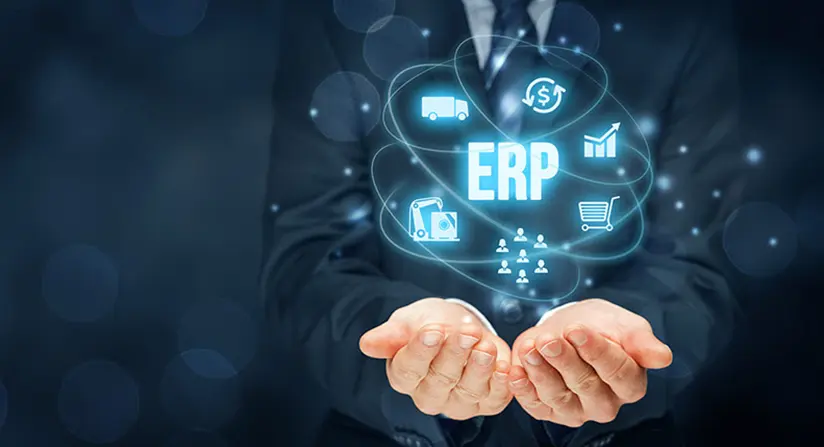-
International Financial Reporting Advisory Services
IFRS reporting advisory serivces of Grant Thornton are carried out by our dedicated team with expertise in IFRS implementation.
-
Audit Services
• Statutory audit • Review of financial statements and financial information • Agreed-upon procedures • FRAS services • Compilation of financial information • Reporting accountant • Cross-border audit • US GAAP audit
-
Audit Quality
We have various methods of monitoring our system of quality control and engagement quality, including real-time involvement of coaches and national office personnel on select audit engagements, reviews of issuer audit engagements prior to archiving by someone outside of the engagement team, and internal inspections of assurance engagements and the system of quality control.
-
Audit Approach
Audit Approach
-
Licensing services
Licensing services
-
International tax planning
Our extensive international network provides us with significant resources to meet all your expansion goals. We strive to develop commercially focused and tailored tax strategies to minimise tax exposures and maximise business efficiency.
-
Expatriate tax planning
We have a broad knowledge base and skills to assist you keep your personal income taxes to a legitimate and reasonable level, while remaining compliant with legislation. We can develop a personalised package for each key employee to take maximum advantage of the exemptions and incentives available.
-
Tax advisory
We will review the proposed business model and transactions and advise on tax implications and recommendations to optimize the tax opportunities under the local regulations and treaties which Vietnam entered into. Furthermore, we coordinate with our GT global tax team to provide a comprehensive tax advisory for the countries involved in the business model and transactions.
-
Tax compliance services
This service is designed to assist enterprises to cope with the statutory tax declaration requirements in line with the Vietnamese tax laws as well as the frequent changes and updates in tax laws.
-
Tax health check
Our Tax Health Check involves a high-level review of specific tax areas to highlight the key issues that need to be rectified in order to reduce tax risks. Through our extensive experience, we have identified key risk areas in which many enterprises are not fully compliant or often overlook potential tax planning opportunities. Our tax health check service represents a cost-effective method to proactively manage risks and reduce potential issues arising as a result of a tax inspection.
-
Transfer Pricing
Transfer pricing is a pervasive tax issue among multinational companies. In Vietnam, the tax authorities require special documentation to report related party transactions. Compliance with transfer pricing regulations is an important aspect of doing business effectively in Vietnam as failure to do so may result in significant penalties.
-
Tax due diligence
We conduct tax due diligence reviews of target companies to analyse their tax exposure and position in relation to acquisitions, mergers or consolidations. We are able to integrate this service with our Advisory Services department in order to offer a comprehensive, holistic due diligence review.
-
Customs and international trade
Our experienced professionals can help you manage customs issues more effectively through valuation planning and making use of available free trade agreements. We also assist Clients in optimising their customs procedures by making use of potential duty exemptions and efficient import-export structures. Risk mitigation activities include customs audit defense and compliance reviews.
-
M&A Transaction
We advise numerous foreign investors on efficient tax structures for their investments. Our experience allows you to consider all the options and set up a corporate structure that meets both operational and tax efficiency requirements. In short, the structure that is best for you.
-
Industrial Zones – Picking A Location For Your Business
Grant Thornton Vietnam’s one-stop services are designed to provide comprehensive support to both new and current investors who are planning to expand or restructure their business in Vietnam. Our professionals have established strong working relationships with landlords, property developers and authorities at various localities. With extensive experiences in liaison with the relevant agencies, we offer assistance including negotiation on land rental rates and efficient management of licensing process. Our customized and flexible solutions can bring benefits of cost efficient location, accelerate licensing process, and optimize tax opportunities while remaining in compliance with legislation.
-
Tax Audit Support
Tax audit support services provide comprehensive assistance to your business in Vietnam. Recent tax practices have shown the general tendency of launching routine tax audit on yearly basis. Tax authorities have been effectively using more sophisticated methods to identify target entities from across different industry sectors.
-
Business Risk Services
Business Risk Services
-
Transaction Advisory Services
Transaction Advisory Services
-
Valuation
Valuation
-
Business consulting services
Finance Management Advisory
-
Accounting services
Accounting services
-
Taxes compliance within outsourcing
Taxes compliance within outsourcing
-
Payroll, personal income tax and labor compliance
Payroll, personal income tax and labor compliance
-
Secondments/Loan staff services
Secondments/Loan staff services
-
Compilation of the financial and non-financial information
Compilation of the financial and non-financial information
-
Accounting systems review and improvement
Accounting systems review and improvement
-
Initial setting-up for accounting and taxes systems
Initial setting-up for accounting and taxes systems
-
Management accounting and analysis
Management accounting and analysis
-
Comprehensive ERP system solution
ERP software is a tool for business operations, production management, order processing and inventory in the business process. Today, ERP software for small and medium businesses has been greatly improved to help businesses manage their business better. The article below will answer all relevant information about what ERP software is and offer the most suitable ERP solution for businesses. Let's follow along!
-
Analyze Business Administration data
We believe in the value that data can bring to the success and development of every business. Our team helps design data architecture supported by tools, to support business governance and provide useful information to management.
-
Financial reporting compliance solution package
Putting financial issues at the heart, this service helps ensure that financial reports for customers comply with both the requirements of Vietnamese accounting regulations and standards (VAS) as well as reporting standards. international finance (IFRS).
-
Third-party ERP extensions
ERP is a long-term solution that requires long-term travel, not short-term. We understand that many businesses cannot deploy the entire ERP system at once due to many different reasons, instead businesses can deploy each part. Over time, these solutions can be expanded to accommodate improved business processes or can even link completely new processes across different departments.
-
Localize, deploy and rebuild the project
Quite a few ERP projects need to be implemented according to current Vietnamese requirements and regulations, but still comply with common international business requirements. These projects need some improvements and adjustments in the right direction.
-
Consulting on technology solutions
We support the selection and implementation of the most suitable solutions, ensuring business efficiency and performance. We will work closely with customers to plan, evaluate and implement the right technology investment strategies and solutions to meet the development needs of businesses.

-
Offshore company establishment service
Using the offshore company model will facilitate the owner in the process of transaction and expand overseas markets, take advantage of the tax policy with many incentives and protect the value of the family enterprise's assets.
-
Private Trust Advisory
The development of the economy with many modern financial instruments has brought many advantages and opportunities for the enterprises, but there are still certain potential risks in any type of business. So how to protect your asset value with an appropriate company structure while stay compliance with relevant regulations?
-
Our values
We have six CLEARR values that underpin our culture and are embedded in everything we do.
-
Learning & development
At Grant Thornton we believe learning and development opportunities help to unlock your potential for growth, allowing you to be at your best every day. And when you are at your best, we are the best at serving our clients
-
Global talent mobility
One of the biggest attractions of a career with Grant Thornton is the opportunity to work on cross-border projects all over the world.
-
Diversity
Diversity helps us meet the demands of a changing world. We value the fact that our people come from all walks of life and that this diversity of experience and perspective makes our organisation stronger as a result.
-
Contact us
Contact us
-
Available positions
Experienced hires
-
Available positions
Available positions
ERP software - Small and medium enterprise management solution
ERP software is a tool for business operations, production management, order processing and inventory in the business process. Today, ERP software for small and medium businesses has been greatly improved to help businesses manage their business better. The article below will answer all relevant information about what ERP software is and offer the most suitable ERP solution for businesses. Let's follow along!
What is ERP software?
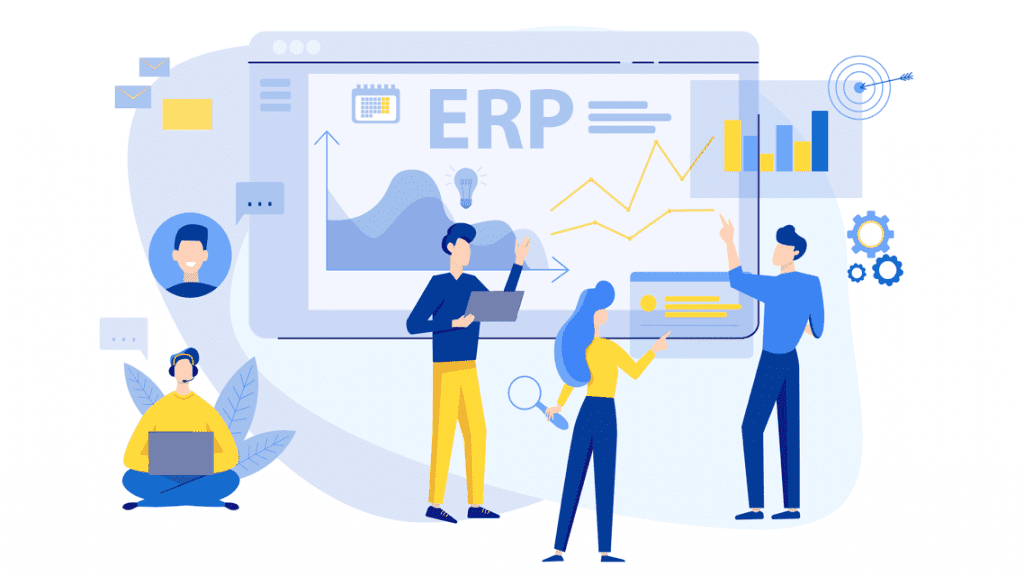
ERP (Enterprise Resource Planning) is software that supports the business management process of enterprises. The main function of ERP software is to integrate all information and data of departments into a single computer system for monitoring, fully meeting the needs of the business, and quite flexible in use. Businesses can think of an ERP solution as a giant software system that solves problems in human resources, finance, production, supply chain, warehouse, purchasing, sales and more.
Characteristics of ERP business management software
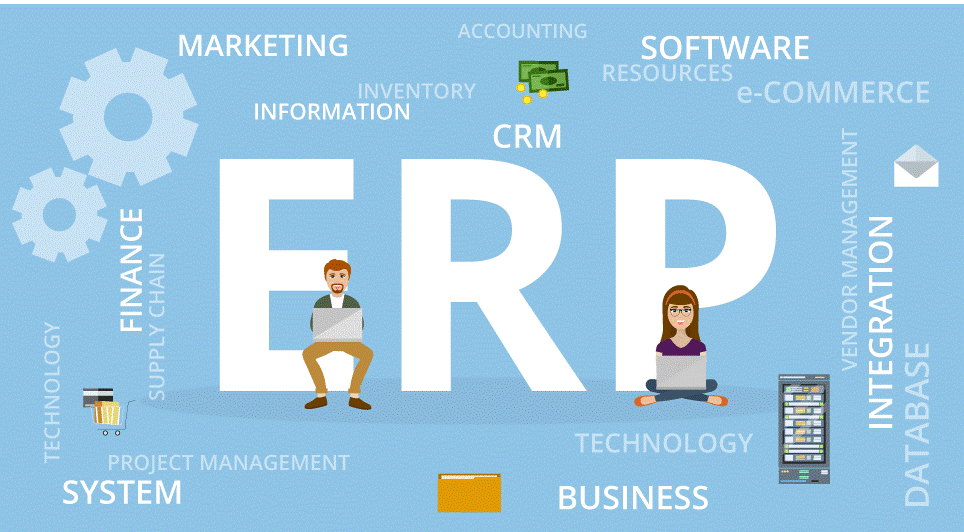
ERP software is designed according to different functional modules
ERP business management software is formed from the connection of many different modules such as accounting, finance, production, sales, etc. Each module undertakes a number of specialized functions for each department. In addition, these subsystems will handle the business of the departments integrated in the ERP system for businesses.
Solutions that integrate real-time assessment capabilities
The ERP system for businesses, through automatic summary reports from departments, will analyze and evaluate the efficiency and progress of business activities of the business. Thanks to that, ERP solutions will help businesses maximize their management of production and business performance evaluation systems. At the same time, the solution also supports managers in coming up with new strategies suitable to the company's operating situation.
ERP software provides full professional functions
Although each software module handles different tasks, it does not mean that information between departments is separate. Information is integrated together for the purpose of linking, inheriting and sharing data. Thanks to that, all information is unified and synchronized, minimizing time, effort and data processing.
It can be said that the modules in the ERP system for businesses are both specifically designed and can be integrated for the specific purposes and requirements of each department's functions and operations. It also ensures that the data system is consistent and consistent throughout the unit or organization.
Flexible design structure
Every business must constantly change to fit business needs and market needs. Therefore, ERP business management software is also designed to be flexible, responding to organizational changes and adjustments not only once but many times.
The ERP system for businesses has an open design, allowing companies to add necessary modules or remove unnecessary modules without affecting the operation of other functions.
Database integrated on one software
All data such as financial data, accounting, human resources, sales, etc. are stored on a common database of the entire enterprise. All data only needs to be entered once and will be circulated for all departments to use. This feature helps the organization's data always be consistent, easy to control, and not scattered, duplicated, or redundant.
The role of ERP software in business operations
ERP software creates a centralized database for businesses because the entire work process is performed on this system. This is the basis for more scientific and diverse data analysis, providing maximum support for managers to make business decisions. Some great benefits that ERP systems bring to businesses include:
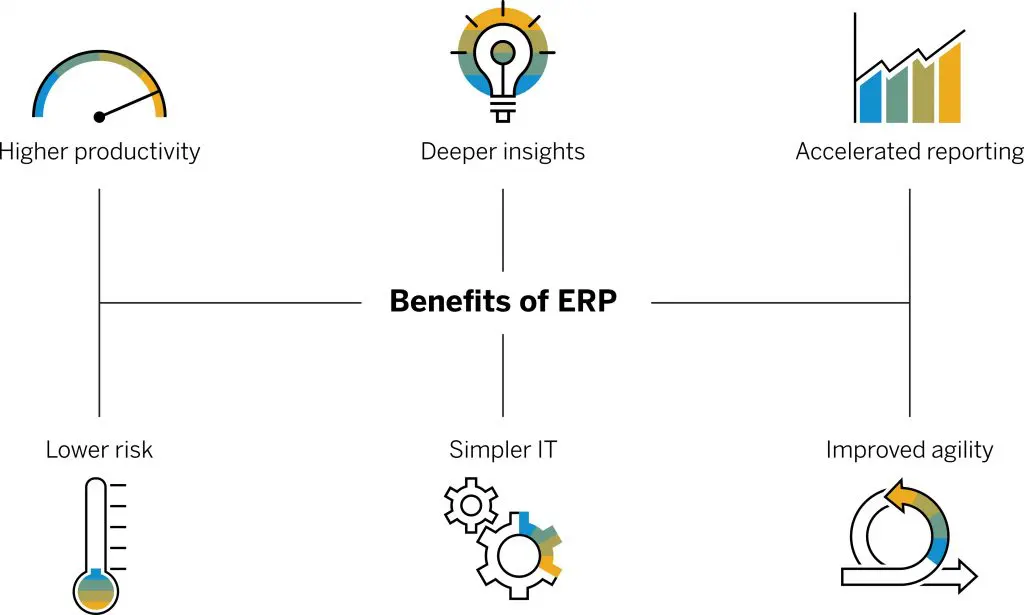
Speed up workflow
A large business requires a complex, multi-step workflow. This process is a complex and invisible network that slows down the pace of work. The speed of a workflow often depends on two main factors: Whether a suitable place to transfer data is identified and whether the transfer process is hindered.
We can clearly see that transferring a paper document cannot be as fast as an electronic document. Or when transporting goods from the warehouse to the business, decisions that are synchronized to the ERP system for the business will reach the warehouse keeper quickly, without having to wait for the whole vehicle to move. By solving difficulties and removing bottlenecks, ERP business management software helps speed up work progress, save time and optimize management activities.
Easily controlling the process is the employee's job
The outstanding advantage of ERP solutions is the ability to unify and scientifically arrange all data and work processes on a common platform. From there, businesses can easily apply internal control mechanisms. The audit tracking function of an ERP system for businesses also allows businesses to quickly find the source of accounting entries and the employees involved.
Employees' working stages are also easily controlled with the intelligence of ERP software. Managers just need to sit in one place and open the unified interface of the application to be able to grasp all the work results of employees throughout the enterprise.
In some cases, ERP software also automatically analyzes the database to assign tasks according to the abilities of each employee. Thanks to that, management will save time and effort on this job.
ERP software helps businesses control finances
Before the ERP system, to control financial information, specialized departments had to synthesize data from many different departments, leading to many errors and discrepancies. To solve this situation, ERP solution is a great choice.
The system gathers all financial information of the enterprise on a common database, with only one version and is transparent in all departments. Therefore, when there is a change in the number, all related information will be arranged and recalculated, limiting negativity and fraud occurring in the organization.
If in the past, large businesses had to wait until the end of the month or period to prepare financial reports, now, management software will give you accurate and timely reports whenever you want.
Minimize errors when entering data
With the traditional way, a data often goes through many different parts and there are confusions and errors. This causes a lot of damage to businesses, affects the working process of a group, worsens the business's image with customers, etc. But if using ERP software, businesses will avoid those mistakes. Because ERP software only needs one person to enter data, this data will then be used throughout, avoiding errors or unnecessary changes.
ERP business management software system
A good ERP system will bring many benefits to businesses. Depends on the person implementing and using the system.
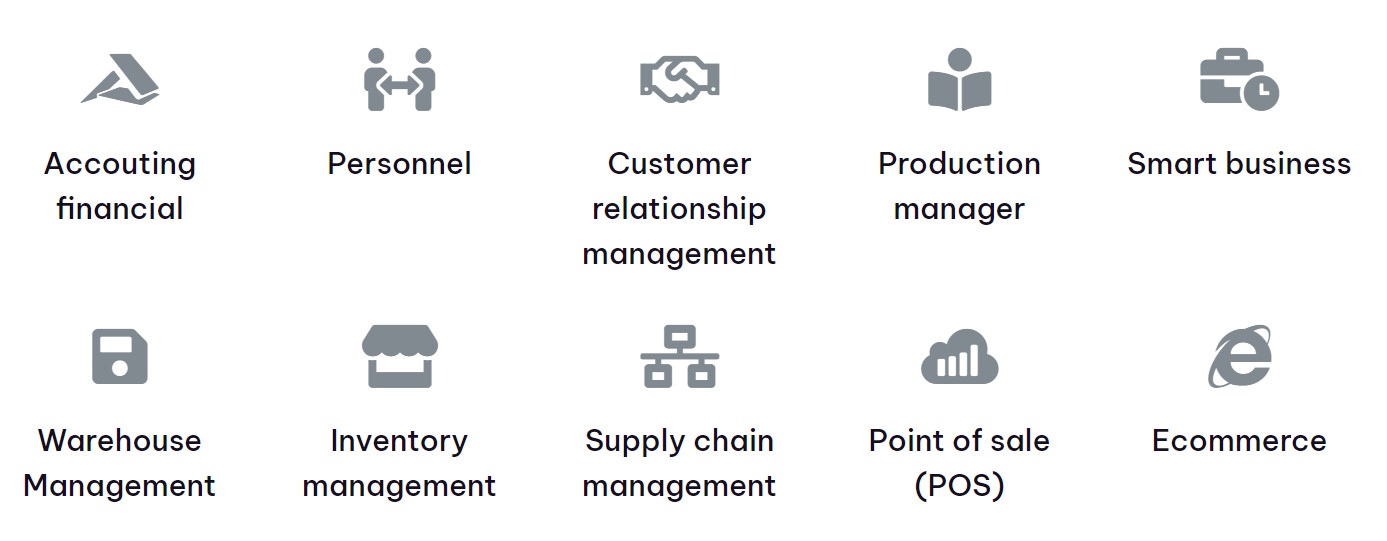
Which businesses is ERP business management software solution suitable for?
After understanding the benefits that ERP software brings, businesses also need to pay attention to a number of additional issues before putting it into use. Specifically, suitable businesses to use the business management system include:
Businesses with huge and large-scale transactions want to use ERP to support strict management processes and avoid unnecessary risks.
Organizations often make mistakes while importing/exporting data.
Businesses with cumbersome and inflexible management systems want to use ERP software to improve this.
Organizations and businesses must possess large funds to ensure both investment in software and regular salary payments to employees. In particular, the use of ERP must be supported by everyone in the company, while contributing to widespread propaganda and promotion.
Organizations and businesses that want to implement digital transformation quickly and effectively can immediately apply the ERP system to support operations and management.
How to choose ERP software for small and medium businesses
Each business has a different scale and business field, so ERP business management software must also be designed differently. Therefore, to optimally choose ERP software for small and medium enterprises, you can consider the following factors:
Ease of use: The software's interface must be simple so that anyone can easily use it. Furthermore, ERP software for small and medium businesses must be compatible with the business's business tools.
Customization ability: It is necessary to consider whether the system can integrate with multiple platforms, a large number of users at the same time, and whether it is suitable when moving to a new business model.
Security: The software must ensure strong security to avoid bad guys stealing internal business information.
Support service: Please learn carefully about the application's support service and associated costs to be able to resolve the problem as quickly as possible.
Above is the most basic and general information about ERP software, ERP solutions for businesses or how to apply ERP software for small and medium enterprises . Hopefully you have had an overview of this solution and understand the role and benefits of this management software for businesses. If you are looking for a business management solution, the ERP system is definitely not a bad choice.
Comprehensive ERP system consulting
The first step of the service will be to evaluate the enterprise's business model and processes to identify data information flows and possible improvements to the operating system. We will provide practical recommendations along with an appropriate choice for a set of ERP systems for businesses to deploy across all departments and teams of the business.
The implementation phase will involve cooperation between our team of experts and all customer stakeholders (management, department managers, departments...) to calibrate the use of ERP software. with improved business processes. We will transfer knowledge to departments of customer businesses through regular training and support.
The ultimate goal is to improve productivity and efficiency and build a sustainable foundation for business success, while quickly adopting best practices, creating time and cost efficiencies. fee.
Our solutions:
Strategy and Roadmap
Full deployment service and software licensing
Data Quality and Transformation
System support after installation, deployment and operation
Improvements as required
Combine a comprehensive package of specialized solutions for each industry and field.



